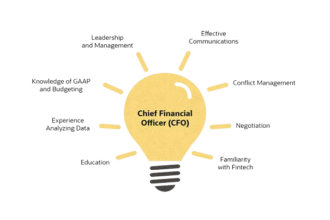The Chief Financial Officer (CFO) holds a pivotal position within an organization, wielding significant influence over financial strategies and decision-making. Let’s delve into the intricacies of the CFO role, exploring their responsibilities, required skills, importance, career trajectory, and evolving role in today’s dynamic business landscape.
What is a CFO?
The CFO is a senior executive responsible for overseeing an organization’s financial activities, including financial planning, budgeting, reporting, and risk management. Key Leadership Position as a key member of the executive team, the CFO collaborates closely with other leaders to drive strategic initiatives and achieve organizational objectives.
What Does a CFO Do?
- Financial Strategy: Develop and implement financial strategies aligned with the organization’s goals and objectives.
- Financial Planning and Analysis: Lead financial planning, budgeting, forecasting, and performance analysis to support decision-making.
- Risk Management: Identify, assess, and mitigate financial risks to safeguard the organization’s financial health and stability.
- Investor Relations: Manage relationships with investors, analysts, and other stakeholders, providing transparency and insight into the company’s financial performance.
- Compliance and Governance: Ensure compliance with regulatory requirements and ethical standards, maintaining financial integrity and accountability.
- Mergers and Acquisitions: Oversee financial due diligence and integration activities for mergers, acquisitions, and strategic partnerships.
Skills and Qualifications of a CFO
- Financial Acumen: Strong understanding of accounting principles, financial analysis, and reporting standards.
- Leadership Abilities: Effective leadership, communication, and decision-making skills to drive organizational success.
- Strategic Thinking: Ability to develop and execute financial strategies aligned with business objectives.
- Analytical Skills: Proficiency in financial analysis, forecasting, and risk assessment to inform strategic decisions.
- Business Acumen: Understanding of industry trends, market dynamics, and competitive landscape.
- Educational Background: Typically holds a bachelor’s or master’s degree in finance, accounting, or a related field. Professional certifications such as CPA or CFA may be preferred.
Why is the CFO Important?
- Financial Stewardship: The CFO plays a crucial role in managing the organization’s financial resources and ensuring long-term sustainability.
- Strategic Advisor: As a member of the executive team, the CFO provides valuable insights and guidance on financial matters to support strategic decision-making.
- Investor Confidence: Effective financial management and transparent reporting instill confidence among investors, contributing to the organization’s credibility and valuation.
Conclusion
Chief Financial Officer (CFO) holds a multifaceted role in driving financial stewardship, strategic decision-making, and organizational success. With a blend of financial acumen, leadership abilities, and strategic foresight, CFOs play a vital role in shaping the future of their organizations and navigating the complexities of today’s business environment.







